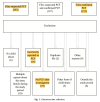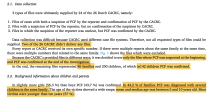Mum in the Netherlands here with a son with ME/cfs and active in advocacy for children with ME and Long Covid (IACC). I've been in recent meetings with this very CACRC (VT we call it) to address the serious ongoing issues with persecution of parents with false allegations of PCF that occur when their child in fact has a post-acute infection illness (IACC) Let's just say they are not very receptive to the data we bring to them.
Dr. Worm's mission in life is to get doctors and other professionals to act on 'alarm signals' (such as frequent visits to hospitals or medically unexplained symptoms or frequent school absence and it goes on, the list fully overlaps with IACC) sooner and to immediately report this as a case of PCF. She is also broadening the terminology so it can apply to more cases - the PCF guideline was just updated and she was a big part of that. Of course she does not bother to distinguish between PCF and IACC even though people like Dr. Rowe have already done the work for her. She believes prevalence is much higher than the general scientific consensus indicates. She works for the CACRC and has built herself up as the main expert in the NL in medical child abuse.
Out of the many ethical and methodological problems in this study, here's what stands out the most:
- The total number of cases she looked at initially was 262. In 89 cases there was suspicion of PCF but it turned out it was not the case (this proves the structural issue of false allegations!). She ended up only including the 142 'confirmed' cases of PCF - these cases were only 'confirmed' by the CACRC themselves - so huge possibility for confirmation bias here.
- 1 out of 3 families from the 'confirmed' PCF cases filed a complaint or took legal action against the CACRC for bias and inaccuracies. Conveniently the author does not know what was in those complaints.
- Children were never included in the case files, they were simply not spoken to. She also infers from the data it's almost always the mothers, mostly the single ones with a history of trauma or who are sick themselves.
If I was one of those parents falsely accused of abuse through PCF when I was dealing with an ill child, I'd be furious if now my file case (even though anonymously) is used to help Dr. Worm in her witch hunt without my consent. She calls her study a 'Groundbreaking effort in PCF research' and of course her 1st recommendation is to train all (medical) professionals in recognising red flags for PCF for early reporting and intervention.
This study is going to wreak havoc overhere in the Netherlands where CBT and GET are still the nr. 1 'safe' treatment for children with ME/cfs in the Guidelines. We need it to be shredded to pieces. Hoping David Tuller will pick this up!
I'm sorry to hear this, it's terrible.
A question I feel needs to be asked, with no assumption or inference, is whether this confusion is deliberate. ie could it be that the actual intention is that the author knows these individuals have ME/CFS and is actually meaning to categorise those who have it under the system where they are treated the same (? I'm assuming, but there could be additional things added on) as those who are child abuse?
That's a first-step question because obviously there are plenty of reasons feeding into that and I simply want to focus on whether actually from a method standpoint that is basically what is being done
Then I guess the second-step question is whether there is 'something' which is genuinely well-expounded in whatever literature that they
are trying to / might need to be aware of and whether that actually looks anything like ME/CFS.
All of these 'been off school' or 'doesn't go to social events' or behavioural supposed flags must have also always historically come with that 'justified by exceptions' caveats of 'which wasn't explained by ill health/beyond what health allowed' type thing, because kids with cancer or who have been in a car crash or who have multitude other conditions aren't all being included I assume.
I don't think it is an obligation for people to assume it is either coincidence or laziness. Given the legal impact.
And I will say that all should be aware of the risk of things like this being potentially used as a weapon ie taking the description of an illness and then just retitling it as 'induced illness'
would be weaponising such powers to even write such things. And so I would expect scrutiny to be equivalent to that risk potential and always checking for it.
And the history of certain schools of thinking wanting to steal powers that they are not due regarding their mode of treatment without responsibility/accountability vs the norm in medicine where someone has responsibility for
outcomes and would be themselves hauled up if they ran a clinic in certain other serious illnesses that either consistently made people worse or chose not to report long-term outcomes or tried to shirk taking responsibility for it.
And these are grown-up people who might feel whatever to the norms other adults have regarding responsibility but it doesn't mean they are exempt from it being discussed in the way it is every day and built-in for every other area, particularly where there is such serious impacts and powers involved. It's normally the opposite that the more serious it is the more oversight some expects they will need to weather and yields to that discompassionately as part of what they signed up for that they need to be showing clean hands and transparency and listening/learning at all times.
I'd imagine if I got dragged into something like this that I'd be answering that question and others like it on a daily basis from concerned people given with child protection it is absolutely always about the balance of harm from missing something vs harm from getting it wrong and undue suspicion on certain demographics basically being discrimination but at a level of impact that is incredibly serious (and so I'd expect I'd have to demonstrate I'd 'checked my bias' etc).


